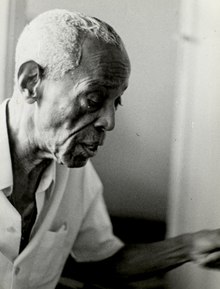Donga (musician)
Donga (born April 5, 1890 in Rio de Janeiro , † August 25, 1974 ibid), actually Ernesto Joaquim Maria dos Santos , was a Brazilian musician.
Life
Donga grew up in a musical family. His father played the euphonium and his mother was an avid singer . He became interested in cavaquinho at an early age and began to learn guitar with Quincas Laranjeiras at the age of 14 . Donga is credited with the composition of the first Samba Carnavalesco, entitled Pelo Telefone ( Over the Telephone ), which was composed in 1916. The piano score was written by his friend Pixinguinha . Pelo Telefone was recorded on record by the band, Oito Batutas , in 1917, and was a huge hit at the Rio Carnival in 1917. With the group Oito Batutas made appearances in Europe in 1922. Then he founded the Orquestra Típica Donga-Pixinguinha together with Pixinguinha . In addition to many other well-known musicians, Donga also worked with the guitarist João Pernambuco . In 1940 he recorded nine of his compositions in the USA under the direction of Heitor Villa-Lobos . Performances with the group Velha Guarda followed in the 1950s . Shortly after his death in 1974, his only solo album was released, on which he interprets his own compositions.
Discography
- Lamento / Amigo do povo (Orquestra Típica Pixinguinha-Donga), Parlophone 1928, 78
- Os teus beijos (Orquestra Típica Pixinguinha-Donga), Parlophone 1928, 78
- Não digahaben / Carinhoso (Orquestra Típica Pixinguinha-Donga), Parlophone 1928, 78
- O meu tipo (Orquestra Típica Donga), Parlophone 1929, 78
- O corta-jaca / Pelo telefone (Conjunto Regional do Donga), Odeon 1938, 78
Web links
- Donga at Allmusic (English)
- Donga at CliqueMusic (Portuguese)
- Origins of Samba - 1916 to 1928 ... ( Memento from January 29, 2006 in the Internet Archive ) (English)
| personal data | |
|---|---|
| SURNAME | Donga |
| ALTERNATIVE NAMES | Santos, Ernesto Joaquim Maria dos (real name) |
| BRIEF DESCRIPTION | Brazilian musician |
| DATE OF BIRTH | April 5, 1890 |
| PLACE OF BIRTH | Rio de Janeiro |
| DATE OF DEATH | August 25, 1974 |
| Place of death | Rio de Janeiro |
